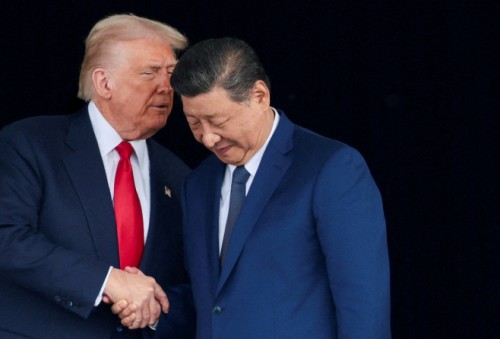 |
| U.S. President Donald Trump (left) and Chinese President Xi Jinping speak as they depart after their summit at Gimhae International Airport on October 30. / Source: Reuters·Yonhap News |
U.S. President Donald Trump and Chinese President Xi Jinping held a phone call in which they discussed Taiwan, the war in Ukraine, fentanyl, and trade issues, the White House and Chinese state media confirmed on November 24.
The two leaders also agreed that Trump will visit China in April next year, with Xi scheduled to make a return state visit to the United States in the second half of 2025.
Trump wrote on Truth Social that he and Xi discussed the Ukraine–Russia war, fentanyl, soybeans and other agricultural products. Their call comes after the two leaders met in Busan on October 30 during the APEC summit in Gyeongju, where they struck a deal: in exchange for China cooperating to curb U.S.-bound shipments of precursor chemicals used to produce synthetic fentanyl, the United States would lower its “fentanyl tariff” on Chinese goods by 10 percentage points. China, in turn, agreed to lift up to 15 percent in retaliatory tariffs on U.S. soybeans and other agricultural imports and to purchase them in large quantities.
Trump said Xi had invited him to visit Beijing in April and that he accepted. Xi, in turn, is expected to visit the United States as a state guest later next year. Trump last visited Beijing in November 2017 during his first term, following Xi’s visit to Trump’s Mar-a-Lago residence in Florida earlier that year.
Trump noted that the phone call was intended as a follow-up to review the agreements made during the Busan summit.
According to China’s Xinhua News Agency, Xi said, “Last month, we held a successful summit in Busan and reached many important agreements.” He added that since the meeting, bilateral relations had “generally stabilized and improved,” earning positive responses from both countries and the international community.
Xinhua reported that Xi placed particular emphasis on China’s “principled position” on Taiwan, and that Trump responded by saying he understood Beijing’s stance. Xi said that Taiwan’s return to China after World War II was part of the postwar international order shaped jointly by China and the United States as victors against fascism and militarism. Trump was quoted as saying that the United States “understands how important the Taiwan issue is to China” and acknowledged China’s significant role in the wartime victory.
Analysts noted that Xi’s remarks on Taiwan come amid heightened tensions between China and Japan following Japanese Prime Minister Sanae Takaichi’s comments suggesting intervention in a Taiwan contingency—prompting Beijing to seek U.S. understanding and support.
Most Read
-
1
-
2
-
3
-
4
-
5
-
6
-
7





















